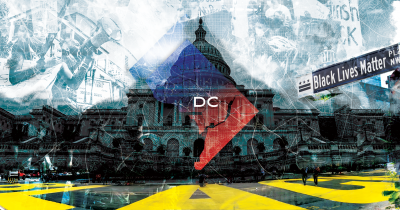
To Form a More Perfect Union: DC Statehood
D.C. statehood is a critical racial justice and democracy issue. To move us closer to an inclusive, multiracial democracy, the House must pass, and the Senate immediately take up and pass, H.R. 51.

This Friday, U.S. representatives will vote on the Washington, D.C. Admission Act (H.R. 51), a historic bill that would make Washington, D.C. the 51st state and end centuries of democratic exclusion of the people who call our nation’s capital home. For more than 2 hundred years, D.C. residents have lacked voting representation in federal government, and Congress has the authority to preempt our lawmaking and veto our budget. D.C. statehood is a critical racial justice and democracy issue. To move us closer to an inclusive, multiracial democracy, the House must pass, and the Senate immediately take up and pass, H.R. 51.
The racial makeup of the District of Columbia is the impetus behind the past and present opposition to admitting D.C. as a state.
Of the roughly 705,000 people living in Washington, 46 percent are Black and 63 percent are people of color more broadly. The racial makeup of the District of Columbia is the impetus behind the past and present opposition to admitting D.C. as a state. The idea of a state comprised predominantly of people of color conflicts with the long-established notions of power and governance by a white majority. It requires a reckoning with a democracy contingent on the decisions of Black and brown people, an acknowledgement that lawmakers are, historically, loath to make.
D.C. has always demanded that reckoning. Long home to a robust community of free Black people, D.C. was the first jurisdiction in the United States to abolish slavery (9 months before Lincoln’s Emancipation Proclamation). D.C. quickly became a majority Black city, and by 1869, D.C. residents had elected Black leaders to every level of local government. Unable to countenance Black leadership and political power, white politicians in Congress eliminated local democracy altogether by replacing the democratically elected D.C. government with a board of 3 (white men) commissioners appointed by the president. In defending the move, Alabama Senator John Tyler Morgan claimed Congress had “to burn down the barn to get rid of the rats . . . the rats being the negro population and the barn being the government of the District of Columbia.”
While the structure and make-up of leadership in D.C. is different today, the racist opposition to D.C. statehood in Congress remains. At a hearing of H.R. 51 in September 2019, ranking Republican Representative Jim Jordan spent most of his time alleging that D.C. is too corrupt or otherwise incapable of managing its own affairs. Such assertions are little more than dog-whistles meant to conjure absurd but nonetheless lingering notions that people of color are somehow less equipped than white people for self-governance.
The consequences of denying democracy to D.C. are as racist as its causes.
The consequences of denying democracy to D.C. are as racist as its causes. Congress repeatedly subverts the will of Washingtonians by preempting local laws that most impact residents of color. As just 2 recent examples, Congress has moved to block gun control measures and prevented D.C. from using our own Medicaid funding on abortion. Over-policing and under-investment in Black communities has created environments in which gun violence disproportionately affects Black people. A recent poll of D.C. residents found that 46 percent of residents in predominantly Black Wards 7 and 8 were acquainted with someone who’s been shot or threatened with a gun in the last 5 years, 12 percentage points higher than the citywide average. Likewise, centuries of economic exclusion and structural racism mean that the overwhelming majority of women who rely on Medicaid—and thus are denied access to abortions through their insurance—are Black or Latinx. Congress’ repeated meddling in D.C. lawmaking, which it wouldn’t be able to do were D.C. a state, severely disadvantages Washingtonians of color.
With democracy unfolding before us in our streets, D.C. needs full authority to be able to protect our residents. As Washingtonians joined Americans across the country in rising up and demanding justice for George Floyd, Breonna Taylor, Tony McDade, and countless Black folks that have been murdered by police, we confronted the National Guard, CBP, Secret Service, US Marshals, AFT, and DEA, among other federal law enforcement bodies. D.C. is already one of the most policed cities in the country, with more officers per capita than anywhere else and more individual police forces than any other city. Now more than ever, we need the will of Washingtonians to lead the struggle for racial justice in our city. We need the autonomy of statehood to create new forms of public safety that actually keep us safe.
Washingtonians must be allowed to implement the protections that Congress has been unwilling to provide and the power to make changes that reflect our needs.
Passing H.R. 51 will move us a step closer to a true democracy. Washingtonians must be allowed to implement the protections that Congress has been unwilling to provide and the power to make changes that reflect our needs. The chokehold of paternalism that is used to justify white territorialism must be released to give voice and full democracy to a historically silenced people. Statehood for D.C. will dismantle one of the core dynamics of white supremacy: that which demands the obsequiousness of people of color against their best interest. When D.C. wins statehood, our victory will build on centuries of Black and brown folk struggling for the right to decide what is in their best interest. When we win, we will show the entire nation what democracy looks like.



